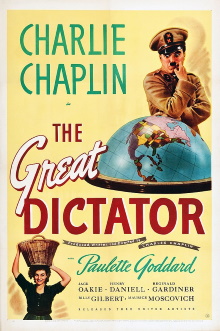This is only the second Charlie Chaplin film I’ve covered here but this was considered his first talking film. Here Chaplin plays dual roles both as an ordinary Jewish barber and a dictator of a fictional country who is of course a parody of Adolph Hitler. While Chaplin’s audacity to make this, at a time when the US was still at peace with Nazi Germany, is commendable, I don’t find this to be a very effective comedy and I prefer him in his silent roles. Furthermore as satisfying as it is to imagine this driving Hitler into paroxysms of rage as doubt Chaplin intended, no amount of mockery of evils such as his can replace actual armed resistance and the true horrors of his regime simply renders any attempts at humor feel simply inadequate.
During the First World War, an unnamed Jewish barber serves his country of Tomania as an inept soldier. He somehow survives and befriends a pilot Commander Schultz but his injuries keep him in the hospital for years with little awareness of the outside world. Meanwhile the ruthless dictator Adenoid Hynkel, who looks exactly like this Jewish barber, has risen to power in Tomania by fostering hatred towards Jews and has ambitions to conquer the world. The barber returns to the Jewish ghetto and standing up for his rights gets into fights with stormtroopers. This impresses a local girl Hannah who falls in love with him. The Jews are granted a temporary reprieve when Hynkel decides to invade the neighboring country of Osterlitz but need to borrow money from a Jewish banker to fund it. Schultz has been promoted since the last war but argues against oppressing Jews and tries to protect his barber friend when they meet in the ghetto again. He is arrested but escapes to hide out in the ghetto with them.
This indeed a sound film though Chaplin tries to keep the talking to a minimum in the role of the barber. As my wife notes, he is better when acting with body language alone and this role of the barber is similar to his more usual tramp character. As Hynkel, I do love how he furiously spits out nonsense German only to inevitable choke and cough. The aim is to make Hitler an object of ridicule and the mockery does work. He insinuates that he isn’t just a fool but is effeminate. The scene where he gracefully dances with a balloon globe of the world is lovely. But I admire the intent behind the mockery more than the humor of the gags themselves. Most of them are too generic and silly to be laugh out loud funny to me and the little skits rarely fit the larger theme. Watching the barber shave someone in time with music is amusing but it doesn’t advance the overall story for example. I was also surprised as the expected exchange of places between the two does occur but comes so late. I’d thought he’d have used that for all kinds of jokes but it’s only to give the film an ending.
The fact that this was first released in 1940 matters and Chaplin started filming only a few days after World War II got started. At the time no one could have known how bad things would get or have any inkling of the Holocaust and so making fun of Hitler and Mussolini seemed funny. Chaplin would later remark that he could not have made this film if he had known. Maybe that’s why this film still strikes a pacifistic and idealistic tone that I think feels naïve. One plotline involves Schultz proposing that the Jews attempt to assassinate Hynkel but they give up because Hannah convinces them how silly that is and that proper Jews don’t do that sort of thing. Then of course there’s the speech that explicitly appeals for peace that was praised at the time and very much amounts to Chaplin breaking character and speaking for himself. I mean that kind of sentiment is nice but history has shown us again and again no matter how ridiculous these demagogues seem to us, there really are people who will fully buy into the hate. There’s no reasoning with and appealing to the better nature of these people. You really do have to fight back.
Anyway I admire Chaplin’s effort here and it is heartening that this was a huge commercial success at the time. But knowing what we do today, I don’t find this film very funny at all. I find it notable that the camera still has to turn away when the stormtroopers are doing really bad stuff, as when they trash the barber’s place. You just can’t make a joke out of real barbarity.
